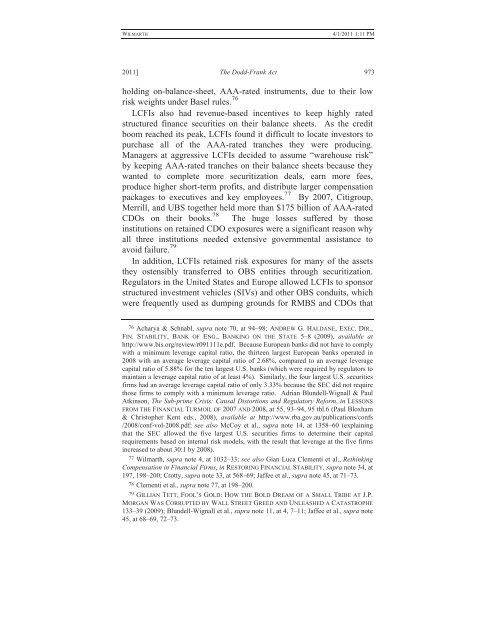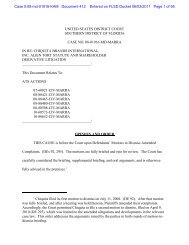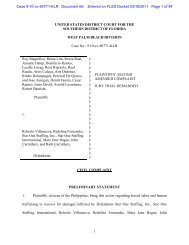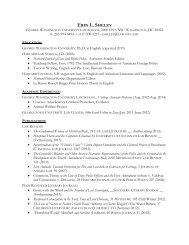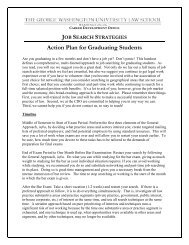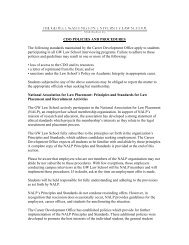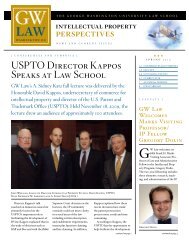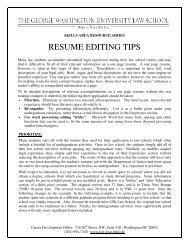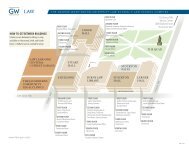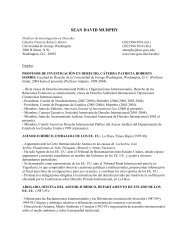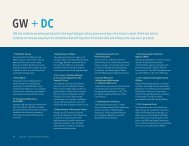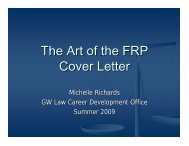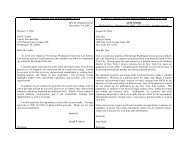CLE Materials for Panel #1 - George Washington University Law ...
CLE Materials for Panel #1 - George Washington University Law ...
CLE Materials for Panel #1 - George Washington University Law ...
Create successful ePaper yourself
Turn your PDF publications into a flip-book with our unique Google optimized e-Paper software.
WILMARTH<br />
4/1/2011 1:11 PM<br />
2011] The Dodd-Frank Act 973<br />
holding on-balance-sheet, AAA-rated instruments, due to their low<br />
risk weights under Basel rules. 76<br />
LCFIs also had revenue-based incentives to keep highly rated<br />
structured finance securities on their balance sheets. As the credit<br />
boom reached its peak, LCFIs found it difficult to locate investors to<br />
purchase all of the AAA-rated tranches they were producing.<br />
Managers at aggressive LCFIs decided to assume “warehouse risk”<br />
by keeping AAA-rated tranches on their balance sheets because they<br />
wanted to complete more securitization deals, earn more fees,<br />
produce higher short-term profits, and distribute larger compensation<br />
packages to executives and key employees. 77 By 2007, Citigroup,<br />
Merrill, and UBS together held more than $175 billion of AAA-rated<br />
CDOs on their books. 78 The huge losses suffered by those<br />
institutions on retained CDO exposures were a significant reason why<br />
all three institutions needed extensive governmental assistance to<br />
avoid failure. 79<br />
In addition, LCFIs retained risk exposures <strong>for</strong> many of the assets<br />
they ostensibly transferred to OBS entities through securitization.<br />
Regulators in the United States and Europe allowed LCFIs to sponsor<br />
structured investment vehicles (SIVs) and other OBS conduits, which<br />
were frequently used as dumping grounds <strong>for</strong> RMBS and CDOs that<br />
76 Acharya & Schnabl, supra note 70, at 94–98; ANDREW G. HALDANE, EXEC. DIR.,<br />
FIN. STABILITY, BANK OF ENG., BANKING ON THE STATE 5–8 (2009), available at<br />
http://www.bis.org/review/r091111e.pdf. Because European banks did not have to comply<br />
with a minimum leverage capital ratio, the thirteen largest European banks operated in<br />
2008 with an average leverage capital ratio of 2.68%, compared to an average leverage<br />
capital ratio of 5.88% <strong>for</strong> the ten largest U.S. banks (which were required by regulators to<br />
maintain a leverage capital ratio of at least 4%). Similarly, the four largest U.S. securities<br />
firms had an average leverage capital ratio of only 3.33% because the SEC did not require<br />
those firms to comply with a minimum leverage ratio. Adrian Blundell-Wignall & Paul<br />
Atkinson, The Sub-prime Crisis: Causal Distortions and Regulatory Re<strong>for</strong>m, in LESSONS<br />
FROM THE FINANCIAL TURMOIL OF 2007 AND 2008, at 55, 93–94, 95 tbl.6 (Paul Bloxham<br />
& Christopher Kent eds., 2008), available at http://www.rba.gov.au/publications/confs<br />
/2008/conf-vol-2008.pdf; see also McCoy et al., supra note 14, at 1358–60 (explaining<br />
that the SEC allowed the five largest U.S. securities firms to determine their capital<br />
requirements based on internal risk models, with the result that leverage at the five firms<br />
increased to about 30:1 by 2008).<br />
77 Wilmarth, supra note 4, at 1032–33; see also Gian Luca Clementi et al., Rethinking<br />
Compensation in Financial Firms, in RESTORING FINANCIAL STABILITY, supra note 34, at<br />
197, 198–200; Crotty, supra note 33, at 568–69; Jaffee et al., supra note 45, at 71–73.<br />
78 Clementi et al., supra note 77, at 198–200.<br />
79 GILLIAN TETT, FOOL’S GOLD: HOW THE BOLD DREAM OF A SMALL TRIBE AT J.P.<br />
MORGAN WAS CORRUPTED BY WALL STREET GREED AND UNLEASHED A CATASTROPHE<br />
133–39 (2009); Blundell-Wignall et al., supra note 11, at 4, 7–11; Jaffee et al., supra note<br />
45, at 68–69, 72–73.


